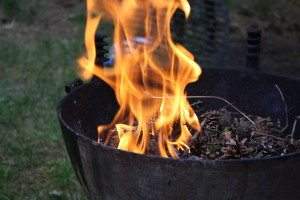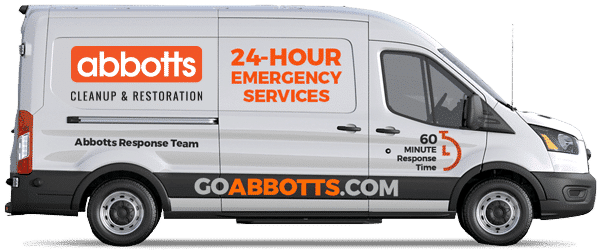Outdoor Fire Safety Tips

As the warmer season approaches, it’s time to refresh our memories about outdoor fire safety. Spring and early summer are great times to get your property cleaned up and ready for the hot, fire-prone months. It is also the time when we have outdoor fires – whether you’re camping, or hanging out for a backyard gathering, there are some fire safety tips you should always be aware of.
Property Clean Up and Debris Burning
Cleaning up the land around your house is especially important to protect your home and other structures from fire. Wildland-urban interface fires are often far more damaging and harder to control and predict than interior home fires. Most experts recommend clearing a 30-foot area around your structures of all debris, trees, shrubs, and overgrown grasses. Some areas do permit private burning of unwanted debris, and if you know what you’re doing, this can be a good way to help your property, valuables, and even fire teams from the negative impacts of a wildland fire.
ALWAYS:
Comply with Local Policies
It’s a good idea to reach out to your local fire department before burning to confirm permission and to find out whether a permit is required to burn debris.
Check the Weather
Weather fluctuations, like sudden gusts of wind or very low humidity, could spark a wildfire. Call the local fire department the day you plan to burn debris to check that the weather is safe enough to burn.
Select a Safe Burning Site
A safe site is far away from all overhead power lines, equipment and vehicles, structures, and plants/trees/shrubs. The vertical clearance should be at least three times, and horizontal clearance at least twice the height of the debris pile- since heat from a fire can extend far past where the flames are.
Prepare the Site
The ground around the burn site should be totally surrounded by gravel or dirt for at least ten feet. Keep this surrounding area well watered down during the burn.
Burn Barrel Tips
Burn barrels must be constructed entirely out of metal and in good condition (no rust on the sides or bottom). They need to be properly ventilated and each vent must be covered with a metal screen to keep sparks from escaping and potentially sparking a wildfire. During the burn, layer different types of debris and stir the barrel often. Wear protective gear and use caution! Again, it is a good idea to call the fire department for advice, barrel inspection, tips, and local regulations.
Stay With your Fire
Do not leave the fire until it is completely out! To get your burn completely extinguished, drown the fire with water, mix the ashes with a shovel and drown it again. This should take you awhile. Drown and stir the ashes several times. Check the burn area regularly over the next few days and maybe even up to several weeks following the burn- especially if the weather is warm, dry, and windy. You do NOT want to be responsible for a fire!
Do Not Burn Illegal/Toxic Items
It is illegal to burn plastic, trash, tires, batteries and most other waste products that aren’t plant-based. Check your local regulations.
Campfire and Backyard Fire Safety
When you are enjoying the outdoors, there are also some age-old tips that a friendly bear has had for decades. Much of the same information listed above applies to building an outdoor fire for enjoyment and warmth. AFTER making sure that fires are permitted wherever you are, here’s a quick list that we all need to remember.
- Find the right spot that is downwind and clear of debris and overhanging branches, tents and equipment.
- Dig a fire pit (one foot deep) and surround the ring with stones.
- Build a manageable fire with kindling and logs- never burn live greenery.
- Keep a bucket of water and shovel nearby.
- Never leave the fire unattended.
- Never burn anything other than wood. Paper, cans, cigarette butts, and plastic are all hazardous to burn and the embers could leap out of your fire pit.
- Drown the flames, ashes, and embers completely before leaving!
Don’t Get Burned!
Here are some final miscellaneous fire safety tips that you should note. Outdoor activities pose some fire risk and it’s always better to be safe and informed than sorry!
Charcoal grilling and ash from outdoor fire pits and fireplaces can certainly start wildfires. When disposing of briquettes or ashes outside, drown and stir them. If you aren’t sure that they’re totally out, repeat the process. If you can’t touch them, they aren’t out! And please, do not bring hot ashes outside in the wind.
Sparks from lawnmowers, chainsaws and other power equipment DO start wildfires. Be very careful on hot, dry days. Also, get your equipment checked regularly. Same advice applies when shooting firearms.
Check to ensure chains and other metal parts aren’t dragging from your vehicle, as well as your tire pressure and brake pads; metal on pavement or gravel causes sparks. Be careful when driving through or parking on dry grass. Hot exhaust pipes and undercarriages can cause the grass to catch fire.
To smoke safely outside, try to find a clear spot to stand or sit in. Stamp out your cigarette, cigar, or pipe tobacco in the dirt. Never on a stump or log. Please do not blindly throw out burning tobacco, especially while driving – using a covered ashtray is always best. And if you’re biking, walking, or horseback riding – just wait to smoke. You never know where the ash will land!
We hope that you have learned some new tips, as well as refreshed your wintery memories about fire safety. Fortunately, Colorado has been spared the raging wildfires that we’re sometimes known to have in previous years, and it is thanks to a combination of Mother Nature and human intervention and awareness. As Coloradoans, it should be important that we try our best to prevent wildfires, so that we can keep our state beautiful and our neighbors safe. As always, if a wildfire or house fire has affected you, Abbotts Fire and Flood Restoration are here to help you get back on track, 24/7-365 days a year.

